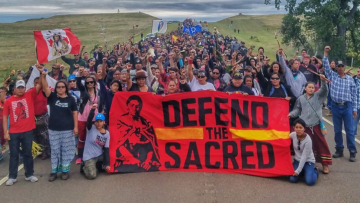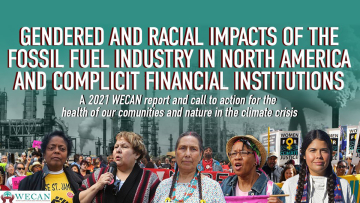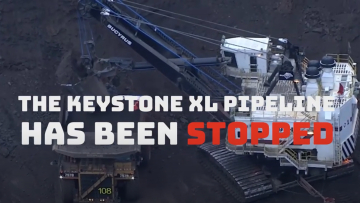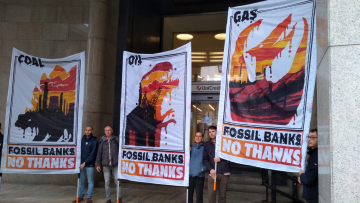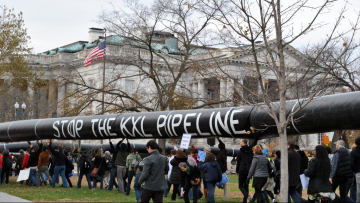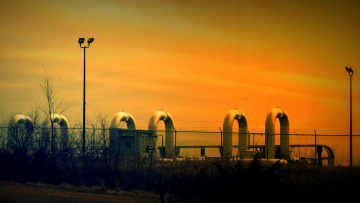Project – On record
This profile is no longer actively maintained, with the information now possibly out of date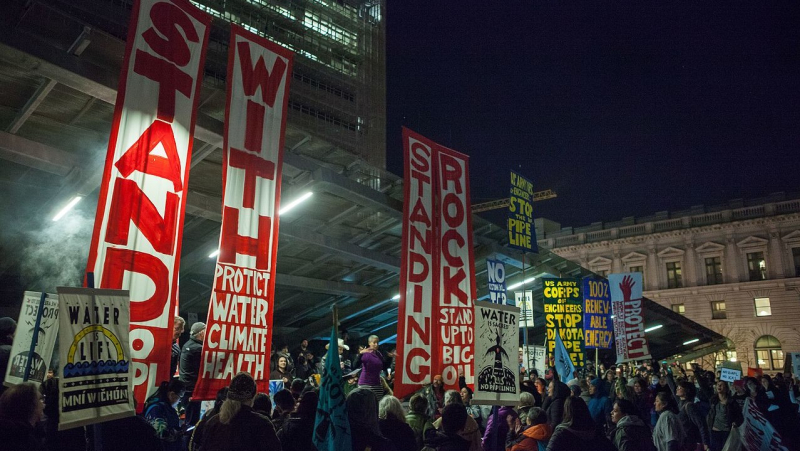
Project – On record
This profile is no longer actively maintained, with the information now possibly out of dateWhy this profile?
The Keystone XL pipeline extension would dramatically increase capacity to process the crude oil locked up in Canada’s boreal forest, it would threaten the health and the way of life of Indigenous communities along the pipeline, and it will have detrimental effects on the surrounding environment.
What must happen
Private banks must not participate in funding this project, whatever form it takes, be it project finance, general corporate loans or underwriting of shares or bonds on the stock markets of the companies involved.
| Sectors | Pipeline Transportation of Crude Oil |
| Location |
|
| Status |
Planning
Design
Agreement
Cancelled
Operation
Closure
Decommission
|
| Website | http://www.keystone-xl.com/ |
The Keystone XL pipeline was proposed by TC Energy (formerly TransCanada Corporation). After extensive opposition, President Biden revoked the project's permit in January 2021 upon entering office, and TC Energy officially cancelled the project in June 2021.
Keystone XL was a proposed a 1,700 mile pipeline that would carry 900,000 barrels of tar sands oil from Hardisty, Alberta to Port Arthur, Texas. The pipeline system, worth USD 12 billion, was proposed in order to link the growing supply of Canadian crude oil to the largest refining markets in the United States. The 36-inch diameter pipeline would connect to storage and distribution facilities at Cushing, a major crude oil marketing/refining and pipeline hub. The proposed route of the pipeline traversed six different states and crosses major rivers including the Missouri and the Red River.
Social and human rights impacts
Indigenous rights: As stated by Francois Paulette of the Smith's Landing Treaty 8 First Nation of the Northwest Territories: "White House policy makers need to know that their appetite for this dirty oil is killing our river and destroying our way of life. The pollutants and heavy metals don't stop at the Alberta border - they run more than 1,000 kilometres all the way to the Mackenzie River, deforming the fish along the way."
There has been much opposition from Indigenous groups from both Canada and the U.S. So much that groups from both countries have joined forces to oppose the project together. According to the Toronto star, there is almost unanimous opposition to the pipeline among tribal communities living close to the proposed pipeline's U.S. route.
A major concern is that the project will disrupt and/or destroy traditional native burial sites in the Sandhills region of Nebraska. Under U.S. law, any such disturbance disqualifies such sites from future inclusion in the National Historic Registry.
Impacts of "man camps". A major concern of communities along the route is the potential increase in crime and sexual violence, especially targeting Indigenous women, arising from so called “man camps.” Studies have shown that the rapid increase in population caused by the hundreds and often thousands of workers being given temporary housing, can lead to an increase in physical and sexual violence and sex trafficking in the affected communities. One study executed in 2019 by the U.S. Bureau of Justice Statistics in the Bakken oil-producing region of Montana and North Dakota, reported that the rate of violent victimization increased by 70%. In contrast, there was no corresponding rise of violent crime in the counties outside of the Bakken oil region. The violent victimization of Blacks and Native Americans was 2.5 times higher than corresponding rates for whites, and, while men experienced higher rates of violent crime as well, women experienced a 54% increase in the rate of unlawful sexual contact, due to a rise in reports of statutory rape. The increase in violence that occurred in the Bakken region due to the increase in population from man camps mirrors a situation that could readily occur in the Keystone XL project in the U.S. The four proposed camps accompanying the South Dakota leg of the project would be closely located to Native lands and would directly interface with Native communities. These risks are covered in more detail in a case study on Keystone XL in the WECAN report, "Gendered and Racial Impacts of the Fossil Fuel Industry in North America and complicit financial institutions".
Health impacts from water pollution: In 2007, Alberta's government approved the withdrawal of 119.5 billion gallons of water for tar sands extraction. An estimated 82% of this water comes from the Athabasca River. Toxic wastewater is discharged in holding or tailing ponds that now leak 11 million litres of toxic waste per day into the Athabasca and seep into the ground water. This water flows northward (downstream) further into Indigenous territories. Since this toxic waste has been flowing into the river and seeping into the groundwater, rare and virulent cancers have affected many of the Indigenous Community members, and fish and game have been found with physical abnormalities, deformations and tumors.
This is also a concern for other communities along the path as the pipeline crosses large water reserves. If there was a leak there could be contamination in drinking water for millions of Americans and devastate the mid-western U.S. economy.
Potential pandemic impacts: Many of the Native communities that live along the pipeline route also feared for their health if TC Energy would have started construction in the midst of the coronavirus pandemic. The coronavirus is already wreaking havoc on isolated reservations in other parts of the country, and the chronically underfunded Indian Health Service is struggling to meet the crisis. Sending thousands of workers into rural and Tribal communities might endanger the health of not only Indigenous communities but also that of the workers.
Environmental and climate impacts
There are various levels of concern for the environment, from the original stages of production, to the processing and transportation of the oil.
For example:
- The toxic waste run off has had detrimental effects on the surrounding environment. In short, the pipeline could pollute air and water supplies and harm migratory birds, fish, and other wildlife.
- The path of the pipeline crosses the Sandhills of Nebraska, which is the largest wetland ecosystem in the United States, as well as the Ogallala Aquifer, which is one of the largest reserves of fresh water in the world.
- Some of the pipeline will also cross an active earthquake zone with a magnitude of 4.3 as has happened in 2002. According to an article published in The Tyee, TC Energy applied to the U.S. government to use thinner steel and pump at higher pressures than normal. Meaning, a leak is not out of the question.
- At the same time, in order to expand production capacity in the Tar Sands, Exxon is seeking permission to haul 200 loads of equipment from Port of Lewiston, ID, along the LoLo Pass to Missoula, MT, with the final destination of the Tar Sands. These shipments are 24 feet wide, 30 feet tall, and up to 262 feet long, weighing up to 500,000 pounds. Many upgrades will be necessary to follow through with this plan as the current route runs through a delicate ecosystem on an unprepared roadway. These transformations would include relocating power and telephone lines, widening and strengthening banks, curves and the road base.
A July 2017 Greenpeace report concluded: oil spills anywhere pose serious risks to human health and the environment, and oil spilled into bodies of water is difficult to fully clean up. Diluted bitumen transported from Canada’s tar sands fields represents a particular threat to water resources along the routes of proposed pipelines.
An oil spill caused by a leak in the Keystone XL Pipeline it not unlikely since it will cross an active earthquake zone. Additionally, other Keystone pipelines have already spilled considerable amounts of oil. Within its first year of operation, TransCanada’s original Keystone Pipeline System leaked 12 times. TC Energy’s Keystone 1 pipeline has spilled 380,000 gallons of oil across North Dakota in 2019, and another 407,000 gallons in 2017 on farmland in South Dakota.
The Keystone XL pipeline is expected to cost USD 8 billion. Until now there has not been specific project finance for the Keystone XL pipeline. Instead, banks have financed the Keystone XL pipeline through general corporate loans to TransCanada Pipelines Ltd. (100% subsidiary of TC Energy that owns and operates the Keystone XL pipeline), bonds, and the sale of company assets. See the finance data below for details. The Government of Alberta also provided finance for the project.
In summary:
- USD 5 billion has already been secured via revolving credit to the pipeline business of TransCanada Pipelines, the project's sponsor, from twenty-one financial institutions. The sum came in three loans that were each updated in December 2019. JP Morgan Chase and Bank of Montreal are the lead banks arranging the credit;
- In March 2020, the Government of Alberta committed to a USD 1.1 billion direct investment and USD 4.2 billion loan guarantee for the project;
- In addition, on April 1, TC Energy's subsidiary TransCanada Pipelines issued a CAD 2 billion bond for general corporate purposes and to repay debt;
- On April 2, the company again issued a CAD 2 billion bond to repay debt and/or finance the company’s long-term investment program. TC Energy has said it will use the proceeds for the Keystone XL pipeline. Joint lead managers for the bonds were Bank of Montreal, Royal Bank of Canada, Scotiabank, TD, Citi and JP Morgan Chase, and a whole range of other banks were co-managers;
- TC Energy expects to obtain USD 4.2 billion in project finance.
Project sponsor
Other companies
ConocoPhillips
United StatesHenkels & McCoy, Inc.
United StatesMichels Corp.
United StatesPrice Gregory International
United StatesSheehan Pipe Line Construction Co.
United StatesTrow Engineering Consultants
CanadaUniversal Pegasus International
United StatesValero Energy Corporation
United StatesApplicable norms and standards
350.org: BIDEN STOPS THE KEYSTONE XL PIPELINE ON DAY 1
Petropolis: Aerial Perspectives on the Alberta Tar Sands
Keystone XL and Dakota Access pipelines controversy explained
Tar Sands Action By “Gasland” Director Josh Fox
Oil On Lubicon Land: A Photo Essay
BigRig
Keystone XL- Get the Facts
Will President Obama prevent the NEXT oil spill disaster?
2021
2021-06-10 00:00:00 | TC Energy officially cancels Keystone XL pipeline
A US$9 billion oil pipeline that became a symbol of the rising political clout of climate change advocates and a flash point in U.S.-Canada relations was officially canceled on 10 June 2021. Keystone XL, which was proposed in 2008 to bring oil from Canada's Western tar sands to U.S. refiners, was halted by owner TC Energy Corp (TRP.TO) after U.S. President Joe Biden this year revoked a key permit needed for a U.S. stretch of the 1,200-mile project. (Reuters)
2021-01-20 00:00:00 | Biden blocks Keystone XL pipeline as one of first acts in White House
President-elect Joe Biden formally announced on Wednesday he was revoking a key permit for the proposed Keystone XL pipeline, the second time a Democratic administration has scuttled the $8 billion project in less than a decade. ... TC Energy, the pipeline's developer, could decide to challenge Biden’s move in court or through the new North American trade deal, which the company did after President Barack Obama first scuttled the pipeline in 2015 over environmental concerns. (Politico)
2020
2020-09-30 00:00:00 | TC Energy signs agreement for Indigenous stake in Keystone XL
TC Energy signed a memorandum of understanding with Natural Law Energy, a treaty alliance of five first nations in Alberta and Saskatchewan, allowing them to pursue an equity stake in Keystone XL and “other potential related midstream and power projects,”. A final agreement is expected in the fourth quarter.
2020-08-06 00:00:00 | 2 Keystone XL pipeline workers get virus
Two people working on the Keystone XL oil pipeline have tested positive for the coronavirus in northern Montana, but construction work will continue after a temporary shut down of a pipe storage yard. Native American tribes and others along the pipeline’s 1,200-mile (1,930-mile) route have raised concerns that workers could bring the virus into rural communities unable to handle a large outbreak. TC Energy this spring negotiated a plan with Montana health officials to minimize virus risks, including checking people entering work sites for fever. The infected workers were in quarantine and not expected to return to the storage yard, where construction was expected to wrap up in coming days, company spokesman Terry Cunha said.
2020-07-14 00:00:00 | Keystone XL Faces New Legal Challenge Over Faulty Federal Review
Conservation and landowner groups filed a new lawsuit today challenging the Trump administration’s approval of the Keystone XL tar-sands pipeline to be constructed on federal lands.
In addition to Nationwide Permit 12, Keystone XL had also been approved by the U.S. Bureau of Land Management to cross approximately 44 miles of federal public lands in Montana. Today’s lawsuit challenges that approval and underlying review by the Bureau and the U.S. Fish and Wildlife Service.
2020-06-15 00:00:00 | Oyen Prepares to Welcome 500 Keystone XL Pipeline Workers
Just across the border in Canada the town of Oyen, approximately 500 crew members are starting to mobilize as the Keystone XL project moves forward.
TC Energy proposed a construction camp to the Town of Oyen and was heard through a virtual town council meeting on May 19 and was approved 10 days later.
2020-05-27 00:00:00 | First piece of disputed Keystone XL pipeline finished
A Canadian company has built the first piece of the disputed Keystone XL oil sands pipeline across the U.S. border and started work on labor camps in Montana and South Dakota despite not having resolved a courtroom setback that would make it hard to finish the project. Work started in April at the border crossing in remote northern Montana. That 1.2-mile section has now been completed except for some site reclamation activity, TC Energy spokeswoman Sara Rabern said.
2020-04-16 00:00:00 | Major blow to Keystone XL pipeline as judge revokes key permit
The controversial Keystone XL tar sands pipeline has been dealt a major setback, after a judge revoked a key permit issued by the US army corps of engineers without properly assessing the impact on endangered species. In a legal challenge brought by a coalition of environmental groups, a federal judge in Montana ordered the army corps to suspend all filling and dredging activities until it conducts formal consultations compliant with the Endangered Species Act. The ruling revokes the water-crossing permit needed to complete construction of the pipeline, and is expected to cause major delays to the divisive project.
2020-03-31 00:00:00 | TC Energy Keystone XL pipeline moves forward after Alberta commits $1.1 billion, shares rise
TC Energy Corp on Tuesday said it would proceed with its $8 billion Keystone XL pipeline with financial backing from the oil-rich province of Alberta, pushing the long-delayed project forward amid a global oil market collapse. With pre-construction activities underway, TC Energy expects the pipeline to enter service in 2023.
2019
2019-08-23 00:00:00 | Keystone XL pipeline set to go ahead as court lifts last major hurdle
Nebraska’s highest court lifted one of the last major hurdles for the Keystone XL pipeline on Friday when it rejected another attempt to derail the project by opponents who wanted to force the developer to reapply for state approval. The pipeline faces intense resistance from environmental groups, Native American tribes and some landowners along the route who worry about its long-term impact on their groundwater and property rights. But in Nebraska, many affected landowners have accepted the project and are eager to collect payments from the company. The Nebraska supreme court upheld the decision of regulators who voted in November 2017 to green-light a route through the state. The court’s decision was a victory for the $8bn project, which has been mired in lawsuits and regulatory hearings since it was proposed in 2008.
2019-07-01 00:00:00 | 'Trump Is Not Above the Law': New Lawsuit Aims to Defeat Keystone XL
As climate scientists on Monday issued a fresh warning about the devastating consequences of continuing to burn and extract fossil fuels, national green groups filed a new federal lawsuit targeting the Trump administration's efforts to force through the long-delayed Keystone XL crude oil pipeline. The lawsuit was filed in the U.S. District Court for the District of Montana, the same court that halted construction on the dirty energy project last year, ruling that the administration hadn't adequately considered the consequences of the pipeline when approving it. In response, President Donald Trump revoked the initial permit and issued a new one in March. The NRDC and CBD joined with Sierra Club, Friends of the Earth, Bold Alliance, and Northern Plains Resource Council in launching the new legal battle, which specifically challenges the Army Corps of Engineers' approval of the pipeline that would transport up to 830,000 barrels of crude oil daily across nearly 1,200 miles from Canada's Alberta tar sands to Steele City, Nebraska.
2019-03-29 00:00:00 | Trump doubles down on Keystone Oil Pipeline with new Permit
President Donald Trump issued a new permit for TransCanada's controversial Keystone XL pipeline Friday, circumventing a court ruling that blocked a previous authorization by his State Department.
The move aims to undercut legal challenges to the $8 billion project, including a November ruling by a Montana-based district judge that faulted the State Department’s previous environmental analysis, according to a person familiar with the matter. It could pave the way for beginning some preliminary work, according to Clearview Energy Partners.
2018
2018-11-08 00:00:00 | Northern Plains Resource Council Wins Keystone XL Lawsuit
Judge Brian Morris levied what could be the final blow to TransCanada’s would-be Keystone XL tar sands pipeline, vacating the 2017 record of decision by President Trump to issue the Presidential Permit for the project. Judge Morris ruled that The State Department’s analysis of the following issues fell short of a “hard look” and requires a supplement to the 2014 SEIS in order to comply with its obligations under the National Environmental Policy Act (NEPA). The Court enjoins prohibits TransCanada from engaging in any activity in furtherance of the construction or operation of Keystone and associated facilities until the Department of State has completed a supplement to the 2014 Environmental Impact Statement that complies with the requirements of the National Environmental Policy Act and Administrative Procedure Act. Read more here.
2018-08-16 00:00:00 | Keystone XL Pipeline Sent Back for New Environmental Review
The U.S. State Department must conduct a new environmental review for the Keystone XL crude pipeline, a federal judge ruled. U.S. District Court Judge Brian Morris in Montana sided with indigenous and environmental groups in ruling Wednesday that a revised Keystone route is “interdependent” on the larger pipeline project and requires one environmental review (Bloomberg).
2017
2017-11-21 00:00:00 | Nebraska commission approves Keystone XL route
The Keystone XL pipeline passed a major hurdle on Monday after Nebraska regulators approved the route for the project, which faced opposition from environmentalists and the Obama administration. The Nebraska Public Service Commission voted 3 to 2 to approve TransCanada's route for Nebraska's portion of the nearly 1,200-mile pipeline. However, the future of the project is still subject to the outcome of a likely legal battle (CNBC).
2017-03-30 00:00:00 | Environmental groups sue Trump administration for approving Keystone pipeline
Several environmental groups filed lawsuits against the Trump administration on Thursday to challenge its decision to approve construction of TransCanada Corp’s controversial Keystone XL crude oil pipeline. In two separate filings to a federal court in Montana, environmental groups argued that the U.S. State Department, which granted the permit needed for the pipeline to cross the Canadian border, relied on an “outdated and incomplete environmental impact statement” when making its decision earlier this month.
2017-03-24 00:00:00 | President Trump approves construction of Keystone XL pipeline
President Donald Trump has approved the construction of the Keystone XL pipeline linking Canadian oil sands to U.S. refiners, a project blocked by former President Barack Obama. TransCanada said earlier in the day the U.S. Department of State had issued a presidential permit for the project (source CNBC).
2015
2015-11-06 00:00:00 | Obama rejects Keystone XL pipeline
President Barack Obama has rejected the proposed Keystone XL pipeline, ending the political fight over the Canada-to-Texas project that has gone on for much of his presidency. Secretary of State John Kerry concluded the controversial project is not in the country's national security interest, and Obama announced from the White House that he agreed (source CNN).
2011
2011-05-04 00:00:00 | Latest update
Recently, support for the project has been reaffirmed through a revised environmental study issued April 16th 2011 by the U.S. State Department. The draft EIS backs last years conclusion which claimed that the pipeline would have "limited adverse environmental impacts." A report released in February 2011 by the Department of Energy states that the pipeline, "could essentially eliminate Middle East crude imports longer term." A tentative decision date was given by the State Department for October 2011.
On June 30, 2010, the commercial operation of the first phase of the Keystone pipeline was commenced by TransCanada. The first stage encompassed the conversion of natural gas pipeline to crude oil pipeline and a construction of a "bullet line" that brings the crude oil non-stop from Canada to market hubs in the U.S. Midwest.
Before TransCanada can begin construction, however, the company needs a presidential permit from the Obama administration. According to a speech in an event she spoke at in October 2010, Secretary of State Hillary Clinton would still be inclined to support the Keystone XL mega pipeline. Full transcript here. President Obama's administration is currently considering the fate of the Keystone XL pipeline. These approvals are thought to encourage the supply of oil and halt the transition to clean and renewable energy.

